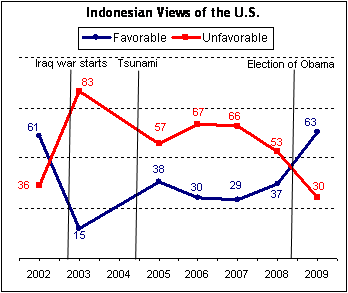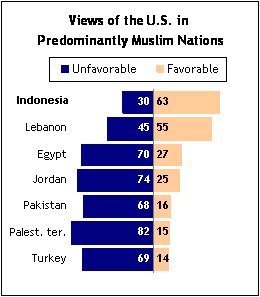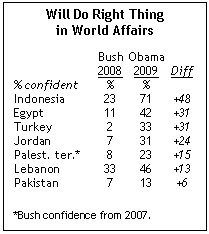by Richard Wike, Associate Director and Kathleen Holzwart Sprehe, Research Associate, Pew Global Attitudes Project
When President Barack Obama finally takes his twice-delayed trip to Indonesia, where he lived for several years as a child, he will visit a country where his personal popularity has dramatically transformed America’s image. Of course, Indonesia is not alone in this pattern — Obama’s election led to better ratings for the United States in many nations around the globe. However, Indonesia — the world’s largest predominantly Muslim country — is an outlier in the Muslim world, where opinions of the U.S. remain mostly negative.
Volatile Ratings for the U.S.

Over the last decade, Indonesian opinions about the U.S. have fluctuated considerably. A 2002 poll by the Pew Research Center’s Global Attitudes Project found that roughly six-in-ten Indonesians (61%) had a favorable view of the U.S., while only 36% expressed an unfavorable view.
With the onset of the Iraq war, however, ratings for the U.S. turned sharply negative. In a 2003 Pew Global Attitudes survey taken shortly after the U.S. invasion of Iraq, only 15% of Indonesians had a positive view, while 83% voiced a negative opinion. America’s image rebounded somewhat in response to U.S. relief efforts following the December 2004 tsunami. A Pew Research survey in April-May 2005 found the percentage of Indonesians with a favorable opinion of the U.S. had risen to 38%.
It was not until the election of Barack Obama, however, that positive ratings for the U.S. returned to their pre-Iraq war level. A Pew Research survey conducted in May-June of 2009 found a dramatic improvement in America’s overall image — the percentage of Indonesians with a favorable opinion jumped from 37% in 2008 to 63% in 2009, while the percentage with an unfavorable view dropped from 53% to 30%.
The U.S. received especially high marks from young Indonesians — 69% of those ages 18-29 expressed a positive view of the U.S., compared with smaller majorities of those ages 30-49 (60%) and over 50 (57%).

The 2009 poll revealed big improvements in America’s image in many other nations as well, especially in Western Europe. Indeed, France and Germany were the only countries where overall ratings for the U.S. improved more than in Indonesia. But — with the exception of Indonesia — there was generally much less improvement in the predominantly Muslim nations surveyed.
Positive views of the U.S. became slightly more common in Lebanon, rising from 51% in 2008 to 55% in 2009. However, Lebanese attitudes toward the U.S. remained sharply divided along religious lines — 90% of the country’s Sunni Muslim population, 66% of Christians and just 2% of the Shia community expressed a positive opinion of the U.S.
U.S. favorability also rose in Egypt (from 22% favorable to 27%) and Jordan (from 19% to 25%), although in both countries only about one-in-four respondents offered a positive assessment of the U.S. In Pakistan, the Palestinian territories, and Turkey there was essentially no change, and positive opinions about the U.S. remained rare.
Positive Ratings for Obama … and High Expectations

Obama has a unique relationship with Indonesia, since the future American president lived in its capital city Jakarta from ages six to ten. And overwhelmingly, Indonesians are aware of this special relationship — 79% said they were aware that he once lived there as a a child.
As was the case in nearly all of the 25 countries included in the 2009 Pew Global Attitudes poll, Indonesians gave Obama considerably higher marks than they had given his predecessor, George W. Bush. Roughly seven-in-ten (71%) expressed confidence in Obama to do the right thing in world affairs, while only 23% had felt this way about Bush in 2008.
Among the other predominantly Muslim nations surveyed, there was far less enthusiasm for the new president. For example, just 42% of Egyptians, 33% of Turks and 31% of Jordanians expressed confidence in Obama. However, even in Muslim nations where his ratings tend to be negative, Obama was consistently more popular than Bush.
Indonesians not only expressed general confidence in President Obama; they also had high expectations for how he will approach international policymaking. More than six-in-ten (62%) said that Obama will consider the interests of Indonesia when making foreign policy decisions. Most (54%) also believed he will be fair in dealing with an issue that is a major challenge for America’s image among Muslim publics: the Israeli-Palestinian conflict.
However, confidence in Obama did not translate into support for all of his policies. While most Indonesians approved of his proposals to close the American military prison at Guantanamo Bay (66%) and to withdraw troops from Iraq by 2011 (75%), Obama’s Afghanistan policy is generally unpopular. Two-thirds of Indonesians (66%) said the U.S. and NATO should remove their troops from Afghanistan.




